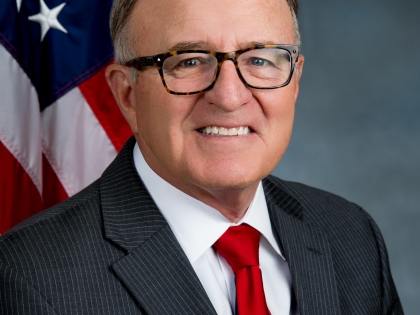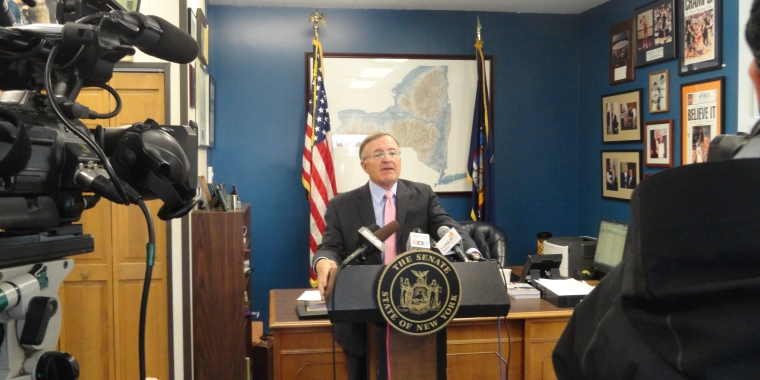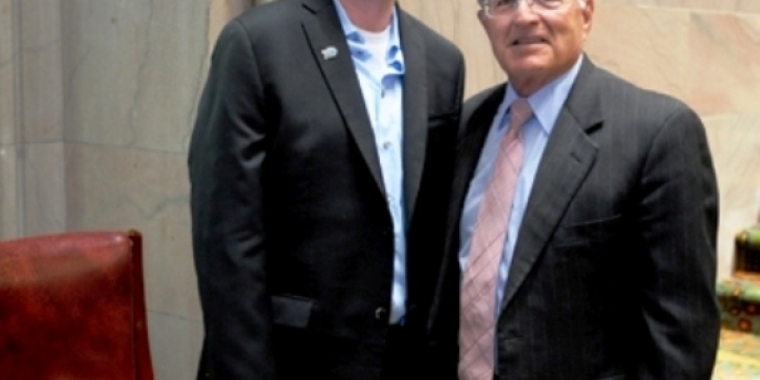
State Senate Passes Package of Bills to Make New York a National Leader in Tackling the Heroin and Opioid Crisis
May 18, 2016
The New York State Senate today (5/18/16) passed a comprehensive package of 22 bills that take a comprehensive approach to fighting the ongoing heroin and opioid addiction crisis. The bills are among the recommendations from a report released today by the Senate’sJoint Task Force on Heroin and Opioid Addiction that reflect the need for improving prevention efforts, increasing access to treatment, expanding recovery options and, providing greater resources to law enforcement to aid in combating this crisis.
Senators Robert Ortt (R, North Tonawanda), George Amedore (R-C-I, Rotterdam), and Terrence Murphy (R-C-I, Yorktown), the Co-Chairs of the Task Force, held a press conference today unveiling the report’s findings and recommendations. The Task Force created a four-pronged approach – focusing on prevention, treatment, recovery, and enforcement – that was used in developing the legislative and budgetary recommendations after extensive collaboration with stakeholders at forums in communities across the state.
Senator Murphy said, “The passage of today’s legislative package by my colleagues in the Senate sends a clear and bold message that New York is not backing down from its fight to win the war on heroin and opioid addiction. These bills represent the four-pronged approach that the Senate's Task Force - which has done incredible work over the past 18 months - believes is needed to provide hope, understanding, and results for those struggling with addiction. I implore the Assembly and the Governor to join us so that together we can give everyone the opportunity to succeed.”
Senator Amedore said, “So many New Yorkers are bound by addiction, but we are lacking services that are accessible and support for those who need it most. The legislation passed today reflects the input we gathered in public forums held across the state to help us develop solutions to address the heroin crisis we are facing in New York. The bills are based on a four pronged approach -- focused on prevention, treatment, recovery and enforcement -- that is necessary to combat this epidemic. These pieces of legislation will help so many individuals and families throughout the state who are struggling with the devastation that is caused by addiction, and I hope the Assembly and Governor join us in this effort.”
Senator Ortt said, “The legislation represents the conclusion of over a year of traveling across the state - from Niagara to Long Island - and listening to those at the front lines of the heroin epidemic. Our proposals incorporate the specific expertise from a broad array of community stakeholders - the heartbreaking stories from addicts and families, best practices from recovery and treatment specialists, preventative outreach from medical and education professionals, and enforcement tools for police officials. As our work continues on this critical issue, I'm hopeful that the Assembly and the Governor will join us to implement these legislative solutions to take back our communities and save lives.”
The bills passed today comprise the majority of the legislative action needed to address many of the issues raised by the state’s opioid crisis, with the remaining legislation expected to be voted upon before the end of this year’s session. The measures include:
Prevention:
· Limiting initial prescriptions of controlled substances S6091B, sponsored by Senator Kemp Hannon (R, Nassau): Limits an initial prescription of a Schedule II and III controlled substance to treat acute pain to a five-day supply. This bill ameliorates the excess volume of pills on the street, while also providing better continuity of care.
· Creating a Prescription Pain Medication Awareness Program S4348A, sponsored by Senator Hannon: Creates a continuing medical education program for practitioners with prescribing privileges. The Department of Health (DOH) and the State Education Department (SED) would establish standards for three hours of instruction to be completed prior to renewal of registration on topics including I-STOP requirements, pain management, appropriate prescribing, acute pain management, palliative medicine, addiction screening and treatment, and end-of-life care. Additionally, it allows for the consideration of existing curricula, and establishes exemptions for practitioners who would not require such training due to the nature, area, or specialty of his or her practice.
· Enhancing patient access to abuse-deterrent technology for opioids S6962A, sponsored by Senator Hannon: Helps prevent the abuse and diversion of opioid prescription drugs by ensuring patient access to abuse-deterrent opioids by prohibiting insurers from disadvantaging drugs approved by the FDA as abuse-deterrent.
Senator Hannon said, “Prescription drug abuse is a growing crisis in both New York State and the country at large. S6091B limits the number of controlled substance pain pills by encouraging patients whose acute pain lasts longer than initially expected to follow up with a doctor and not keep taking pain pills which can lead to addiction, and lessens the number of pills left in medicine cabinets and available for diversion. S6962 encourages the use of abuse-deterrent technologies as part of a broader plan to reduce opioid addiction and abuse, to ensure insurance coverage does not deter the use of abuse-deterrent opioids. Finally, to ensure appropriate prescribing of pain medication, which in turn will result in a decrease of prescription drug dependence and abuse throughout the state, S4348 will require health care professionals authorized to prescribe controlled substances to complete medical education on pain management, palliative care, and addiction.”
· Ensuring proper opioid education to prescribed patients S7315, sponsored by Senators Murphy, Amedore, and Ortt: Requires the state Office of Alcoholism and Substance abuse Services (OASAS) to create either a card or pamphlet that will be included in every opioid prescription dispensed, which includes the following information: the risks of using such controlled substances; the physical, behavioral, and advanced warning signs of addiction to such substances; the HOPELINE telephone contact number and text number (HOPENY) operated by OASAS; the procedures for safe disposal of drugs; and any other information the commissioner deems necessary. Additionally the bill requires the same information be provided to patients administered opioids while in the hospital, and requires acknowledgment of receipt of the information in the patient’s discharge plan.
· Establishing a Narcan kit registry S6516A, sponsored by Senator Amedore: Directs DOH to expand its reporting of opioid overdose data by tracking the number of opioid overdoses generally, in addition to the number of opioid overdose deaths. The Department is also required to examine data related to areas of the State experiencing high rates of opioid overdoses and if any areas of the State have reduced overdose rates after receiving State resources or services. These vital statistics will allow the state to gain a greater understanding of which areas of the state are struggling the most with this crisis, helping to better allocate funds.
· Providing instruction of mental health, alcohol, drug, and tobacco use in junior and senior high schools - S5546A, sponsored by Senator Rich Funke (R-C-I, Fairport): Requires the Commissioner of Education to make recommendations to the Board of Regents relating to the adoption of instruction curriculum in mental health for junior and senior high school students and to provide school districts with current information on drug abuse issues. It is important that students be taught about mental health illness and stop the stigma that goes along with a diagnosis.
Senator Funke said, “The seeds of addiction, including heroin and opioid abuse, are often sown at a young age. We’ve heard from many scholar athletes who were prescribed opioid-based pain killers for injuries in their youth, only to have that serve as a gateway to heroin addiction later. More preventative education could go a long way to help keep our kids healthy and addiction-free and I thank my colleagues for their support of this common-sense approach.”
· Requiring patient counseling prior to issuing a prescription for a schedule II opioid - S7365, sponsored by Senator Fred Akshar (R-C-I, Colesville): Requires health care practitioners to consult with a patient regarding the quantity of an opioid prescription and the patient’s option to have the prescription written for a lower quantity. The physician must also inform the patient of the risks associated with taking an opiate medication, and the reason for issuing the medication must be documented in the patient’s medical record.
Senator Akshar said, “In my previous career as an undercover narcotics investigator, I witnessed families being ripped apart by this heroin epidemic. It taught me that we can't enforce our way out of this problem. Since starting my new job, I've focused on prevention, treatment and recovery, education and enforcement. There's a time to listen and there's a time to act. The Task Force listened to families and communities across the state. Now we're acting on comprehensive legislation to fight this scourge. The heroin epidemic did not arrive at our doorstep overnight, and it won't be eliminated overnight either. It knows no social or economic class, no race or creed. We need to come together as a state to fight this problem together. We can't allow more people to die.”
Treatment:
· Continuing education for credentialed alcoholism and substance abuse counselors -S7301, sponsored by Senators Amedore, Murphy, and Ortt: Requires credentialed alcoholism and substance abuse counselors (CASAC) to complete training in medication assisted treatment (MAT) as part of their continuing education requirement.
· Removing barriers to Medication Assisted Treatment (MAT) - S7317A, sponsored by Senators Murphy, Amedore, and Ortt: Removes a barrier to obtaining MAT by prohibiting managed care providers, under the medical assistance program, from requiring prior authorization for the dispensing of buprenorphoine for treatment of opioid addiction.
· Enhancing emergency intervention procedures - S6248B, sponsored by Senator Ortt: Extends the amount of time a person can be involuntarily held for a substance abuse disorder for emergency care from 48 hours to 72 hours and establishes criteria in which a person may be involuntary sent to treatment for a substance abuse disorder.· Establishing assisted outpatient treatment for substance use disorders - S631, sponsored by Senator David Carlucci (D, Rockland/Westchester): Enables a court to order assisted outpatient treatment (AOT) for an individual with a substance use disorder who, due to his or her addiction, poses a threat to him or herself or others.
Senator Carlucci said, “Heroin and opioid addiction have become an epidemic across the Hudson Valley, and throughout New York State. We do not need to see statistics to know that this issue plagues our area - we only need to look towards the families that have lost their loved ones, and those that are struggling with this addiction every day. I have been proud to take the lead on this issue by hosting Naloxone training to save lives during an overdose, as well as championing legislation to combat this scourge. Today, I am proud to work with my colleagues in the Senate to pass this important legislative package.”
Recovery:
· Including for-profit providers in the RFP Process for substance use disorder and gambling programs - S7446, sponsored by Senator Amedore: Authorizes OASAS to provide funding to substance use disorder and gambling programs operated by for-profit agencies. Current law prevents for-profit organizations, which provide similar treatment services, from applying for state contracts through OASAS. Allowing these entities to offer services, if they are cost-effective, will expand capacity and allow more individuals to enter treatment.
· Creating a Sober Living Task Force - S3989A, sponsored by Senator Thomas Croci (R, Sayville): Establishes the Sober Living Task Force, charged with establishing best practice guidelines for sober living residences that illustrate the most appropriate and effective environment for persons recovering from a chemical dependency. The task force must report to the Legislature no later than one year after the effective date of this act. Stable, and safe, alcohol and drug free housing promotes long term recovery for individuals suffering from a chemical dependency. The findings of this Task Force will allow the Legislature to determine the most appropriate way to support the housing needs of individuals in recovery.
Senator Croci said, “It is a crisis that requires action, not words. We are experiencing a true epidemic of heroin and opioid abuse and overdose deaths. It is an equal opportunity killer in every community and we are taking action to save lives and protect families.”
· Expanding treatment options for judicial diversion participants - S6874, sponsored by Senator Murphy: Establishes that participation in a judicial diversion program cannot be conditioned on the specific type or brand of drug prescribed to a defendant during the course of medically prescribed drug treatments under the care of a health care professional.
Enforcement:
· Facilitating the conviction of drug dealers - S100, sponsored by Senator Phil Boyle (R-C-I, Suffolk County): Allows someone to be charged with the crime of intent to sell if they possessed 50 or more packages of a Schedule I opium derivative, or possessed $300 or more worth of such drugs. Because heroin is so potent and is sold in relatively small quantities, dealers can carry enough of the drug to cause significant harm before triggering a felony charge of possession. Conversely, due to the nature of heroin use and addiction, most heroin users do not possess more heroin than they intend to use at that time, as someone high on heroin has no impulse control and will typically continue to consume all heroin available until it is gone.
Senator Boyle said, “Heroin is destroying the fabric of our society, as evidenced by the daily news of overdose deaths throughout the state. Victims, families, communities, and even law enforcement are crying out for help. The legislation we proposed today will do just that. For the past three years, my Senate colleagues and I have taken the time to listen and then write meaningful laws that will provide all communities with the tools to advocate for prevention, support victims, target heroin dealers, and stop the flow of this drug that is killing those that we love.”
· Expanding the crime of operating as a major trafficker - S4177, sponsored by Senator Murphy: Helps strengthen the laws relating to major drug traffickers to more accurately reflect the nature of their criminal enterprises and increase successful prosecutions. The bill changes the number of persons needing to be involved and charged as part of a drug organization from four to three. Also, to reflect the low street prices of heroin, the bill lowers the minimum required proceeds from the sale of controlled substances during a 12 month period from $75,000 to $25,000.
· Creating Drug-Free Zones around drug or alcohol treatment centers and methadone clinics - S7200, sponsored by Senator Akshar: Creates “drug-free zones” prohibiting the criminal sale of a controlled substance within 1,000 feet of a drug or alcohol treatment center and methadone clinic, similar to “drug-free zones” for schools. Statistics show that most often, drug dealers prey on these individuals by sitting in the immediate vicinity of a drug or alcohol treatment center or methadone clinic waiting for the addict to come out so they can sell them drugs. By designating the areas surrounding drug or alcohol treatment centers and methadone clinics as drug free zones, which comes with it an increased penalty, those predator drug dealers will be deterred from this deplorable practice.
· Establishing appropriate penalties as it relates to heroin sales - S7012, sponsored by Senator Ortt: Creates appropriate levels of weight as it relates to the sale of heroin. Heroin weighs less than other drugs and therefore more doses of heroin are needed to trigger various criminal offenses.
· Enhancing judicial access to juvenile records for determining judicial diversion program eligibility - S6317, sponsored by Senator John A. DeFrancisco (R-C-I, Syracuse): While the positive effects of judicial diversion cannot be disputed, current law does not give judges access to all criminal records - records that could exclude potentially violent or dangerous individuals from judicial diversion programs and prevent casualties. This bill would ensure that judicial diversion is utilized by granting judges the ability to unseal records when evaluating whether defendants should be placed in a judicial diversion program.
Senator DeFrancisco said, “The recent death of NYPD Officer Randolph Holder is a clear example of why judges should be allowed to view sealed records, when determining whether a defendant should enter a judicial diversion program. In this particular case, the defendant had a sealed record containing a violent history, but he only was sent to a drug rehab program and was out on bail, when he shot and killed Officer Holder in cold blood. Allowing sealed records to be a part of this review process will help to prevent such tragic acts in the future.”
· Adding fentanyl to the controlled substance schedule - S6632A, sponsored by Senator Croci: Designates three fentanyl derivatives as Schedule I controlled substances bringing New York’s schedule in line with the current Federal Schedule and increases criminal penalties for the sale of an opiate controlled substance containing a fentanyl derivative. According to the New York Times, fentanyl is 100 times as powerful as morphine and requires more Naloxone to reverse the effects of an overdose. The prevalence of fentanyl abuse has been on the rise due to its low cost. Drug dealers have been mixing fentanyl with heroin in order to produce a cheaper product, which often results in a lethal combination.
· Establishing Xylazine as a controlled substance - S7397, sponsored by Senator Murphy: Ensures proper safeguards against the criminal diversion of Xylazine, by designating it as a schedule III controlled substance. Xylazine is a veterinary sedative which has been found mixed into heroin by drug dealers to increase the effects of the drug.
· Creating the crime of homicide by sale of an opioid controlled substance - S4163, sponsored by Senator Amedore: Holds drug dealers accountable for lives lost as a result of their activities by creating an A-I felony for the unlawful transportation or sale of an opioid controlled substance that causes the death of another person.
In March, the Senate passed a bill (S994), sponsored by Senator Martin Golden (R-C-I, Brooklyn), that is also included in the Task Force Report. That measure enhances penalties for the sale of controlled substances on park grounds and playgrounds.
The bills have been sent to the State Assembly.
The full report from the Joint Task Force on Heroin and Opioid Addiction can be reviewed at:
https://www.nysenate.gov/sites/default/files/articles/attachments/htf_report_final2.pdf
###
Share this Article or Press Release
Newsroom
Go to NewsroomSenator DeFrancisco Visits Auburn Memorial Hospital
March 6, 2015



